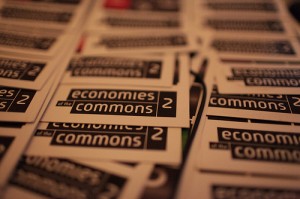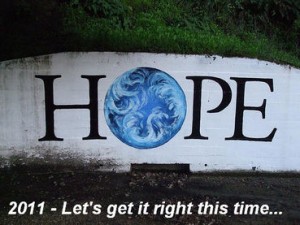I Have Just Two Words for You…
“The Commons” — Lifeblood of Our Communities
by Jay Walljasper
Even if you’ve never seen the movie, you know the line from The Graduate when Benjamin, the befuddled recent college grad, is accosted by one of his dad’s friends with this unsolicited career advice: “I want to say one word to you … Plastics!â€
 Well, I’m feeling the same way about two words: “The Commons!â€
Well, I’m feeling the same way about two words: “The Commons!â€
The commons means “all that we share and the ways we share it†— an immense bounty of wealth that belongs to each of us. This covers air and water, national parks and city streets, scientific knowledge and the latest dance steps.
And I believe the spirit and practice of the commons is crucial to making our cities and towns better places for everyone to live. All the places where people connect in our neighborhoods — sidewalks, parks, coffeeshops, community gardens, libraries, bike trails, transit, even the streets — are commons. And so are all the ways we connect — activist groups, online networks, informal gatherings, recreational activities.
The commons is the lifeblood of our communities, and without it what’s best about city life shrivels and dies. Who wants to live somewhere where there’s little to do but sit inside our private homes, no matter how grandly furnished and architecturally dazzling they are? That’s why the enduring mantra of real estate is “location, location, location†— because we want to live close to where the action is, where people hang out and have fun together, whether it’s hot music clubs or a quiet city park.
I devote an entire chapter in my just-published book All That We Share: A Field Guide to the Commons (written with others from On The Commons) to the urban commons, exploring the ways that neighborhoods everywhere can thrive by sharing the assets they hold in common. Here are some of my favorite examples from the book.
We’re King of the Road All of us live right on a commons that we seldom recognize: the street. For most of human history, streets were the river of life where kids played, teens flirted and old folks gossiped. Over the last 80 years, however, this public space has become the exclusive domain of cars. But not forever. Around the world bikers, pedestrians and even kids playing ball are reclaiming roadways as shared spaces. Traffic calming helps give everyone else equal standing with motorists while community groups take back the streets by painting murals in the intersections, plugging meters to turn parking spaces into mini-parks and other creative actions.
POPS: Privately-Owned Public Spaces While your local coffeehouse, bookstore, tavern, infoshop, church or cowork space may technically be private property, it often functions as a commons. Savvy neighborhood merchants know they are not in the business of dispensing espresso or India Pale Ale. That may be where their income is, but people coming through the door to enjoy public life is the reason they are in business.
Redesigning Cities for Happiness Former Bogotá mayor Enrique Peñalosa says good public spaces are essential to social justice because they are the only spots where rich and poor meet on equal footing. He built and refurbished large numbers of parks, libraries, bike trails, playgrounds, schools and pedestrian streets across the city, and inaugurated a high-speed Bus Rapid Transit system that offers subway-style speed at a fraction of the cost. Even if equality of income is impossible under a market economy, he says, “we can seek to achieve quality-of-life equality.â€
Social change is not something easily diagrammed on a chart. Sweeping transformations that rearrange the workings of an entire culture begin imperceptibly, quietly but steadily entering people’s minds until one day it seems the ideas were there all along. Even in our age of instantaneous information — when a scrap of information can zoom around the globe in mere seconds, people’s world views still evolve quite gradually.
Today, it feels as though everything is for sale to the highest bidder — from the names of sports stadiums to DNA sequences that make human life possible. Since the 1980s, reform movements of the left and center successfully resisted certain extreme elements of the radical right agenda, but many Americans still believe a free-market blueprint for the future is inevitable. Progress, once viewed as the gradual expansion of social equity and opportunity, is now widely viewed as the continual expansion of economic privatization and unchecked corporate power.
There are emerging signs that market fundamentalism has passed its peak as the defining idea of our era. In the United States, the first glimmer of hope was when the Bush administration’s plan to partially privatize Social Security funds in  the stock market gained little traction in Congress and public opinion. Painful financial upheavals around the globe revealed the glaring weaknesses of the current economic model for all to see, leaving some market true believers scrambling to embrace new policies. Yet old ideologies don’t quietly fade, especially when they enjoy sizable support in the corporate world. We’ve seen a fierce backlash against Barack Obama’s admittedly modest departures from rigid market thinking. At the same time, a group of activists, thinkers, and concerned citizens around the world who are rallying support for the idea of a commons-based society. At this point, they’re a scrappy bunch — many with backgrounds in various social movements, community causes, and Internet initiatives — not so different from the dedicated market advocates of the 1950s, except in where they place their hopes. These commoners, as they call themselves, see possibilities for large numbers of people of diverse ideological stripes coming together to chart a new, more cooperative direction for modern society.
the stock market gained little traction in Congress and public opinion. Painful financial upheavals around the globe revealed the glaring weaknesses of the current economic model for all to see, leaving some market true believers scrambling to embrace new policies. Yet old ideologies don’t quietly fade, especially when they enjoy sizable support in the corporate world. We’ve seen a fierce backlash against Barack Obama’s admittedly modest departures from rigid market thinking. At the same time, a group of activists, thinkers, and concerned citizens around the world who are rallying support for the idea of a commons-based society. At this point, they’re a scrappy bunch — many with backgrounds in various social movements, community causes, and Internet initiatives — not so different from the dedicated market advocates of the 1950s, except in where they place their hopes. These commoners, as they call themselves, see possibilities for large numbers of people of diverse ideological stripes coming together to chart a new, more cooperative direction for modern society.
The volatile political mood of our era bears some resemblance to the late 1970s when liberalism was losing its footing and conservative policy makers refashioned their old political rhetoric, based on social exclusion and apologies for capitalism, into a shiny new philosophy: “the market.†Previously the thrust of right-wing thought had been focused on what they were against (civil rights, labor unions, social programs, etc.), but by claiming the market as their mission, they were able to emphasize instead what they were for. The success of that rebranding has led to many of the problems we now grapple with today.
In the same way, commons-based thinking could eventually shift the balance of politics in the United States and the world. Yet unlike market fundamentalism, the commons is not just old wine in new bottles; it marks a substantive new dimension in political and social thinking.A commons-based society holds considerable appeal for progressives after a long period in which the bulk of their political work has been in reaction to initiatives from the right. Activists across many social movements, now aware that an expansive political agenda will succeed better than narrow identity politics and single-issue crusades, are starting to experiment with the language and ideas of the commons. This line of thinking also makes sense to some traditional conservatives who regret the wanton destruction of our social and environmental assets carried out in the name of a free-market revolution. In the truest sense of the word, the commons is a conservative as well as progressive virtue because it aims to conserve and nurture all those things necessary for sustaining a healthy society.
Growing numbers of citizens — including many who never before questioned the status quo — now seem willing to explore new ideas that once would have seemed radical. Millions of Americans are now making shifts in their personal lives such as buying organic foods, using alternative medicine, collaborating online, and searching for something beyond consumerism that offers a sense of meaning in their lives. They may not yet be sprinkling their conversations with the word commons, but they are looking for changes in their lives.
Now is the time to introduce a decisive shift in worldview. People everywhere are yearning for a world that is safer, saner, more sustainable and satisfying. There’s a rising sense of possibility that even with our daunting economic and environmental problems, there are opportunities to make some fundamental improvements. Everyone deserves decent health care. The health of the planet should take precedence over the profits of a few. Clean water, adequate food, education, access to information, and economic opportunity ought to be available to all people. In other words, a commons-based society. Let’s transform that hope into constructive action.
Jay Walljasper is co-editor of OnTheCommons.org. He is the author of the new book All That We Share: A Field Guide to the Commons (The New Press, 2010), a Contributing Editor at National Geographic Traveler, a Senior Fellow of the Project for Public Spaces, and a Contributing Author for New Clear Vision.

I Have Just Two Words for You… "The Commons" http://t.co/YA6E9gR
1